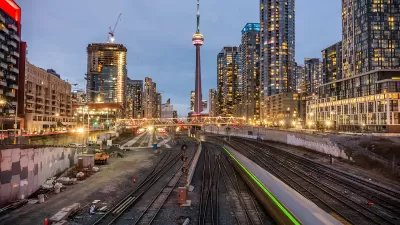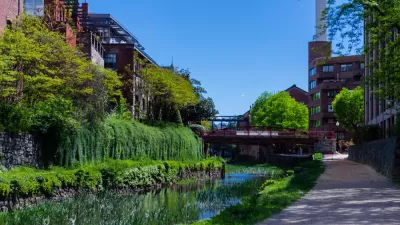Chuck Wolfe suggests we all have the inspiration within us to envision how to remake our cities--from the conjecture of a Seattle restauranteur about Seattle's monorail to neighborhood examples of "we used this before, let's use it again".
As part of a continuing series in Crosscut, Wolfe uses the foil of New York's High Line linear park to explain the role of vestiges of times gone by, beginning with a recent lunchtime suggestion by Seattle restauranteur Tom Douglas.
Douglas's suggestion? Abandon and green Seattle's monorail tracks--in the spirit of the High Line-- and provide walkable restaurant destinations along the way.
Drawing from landscape essayist J.B. Jackson, as well as his own book, Wolfe references the role of leftover structures in cities, and how, according to Jackson, they inspire us "to restore the world around us to something like its former beauty."
He notes other urban rails-to-trails examples--former land uses and infrastructure that have become, intentionally or otherwise, "eerily similar" to what transit and walkability advocates call for today. In merging former rail lines and current bike and pedestrian paths, these examples "illustrate firsthand Jackson's reasons for championing accessible, nostalgic vestiges of an urban past".
Wolfe concludes:
As Jackson noted, "Ruins provide the incentive for restoration, and for a return to origins." So too, they inspire Tom Douglas, and maybe you, to find your own "High Line.” Which is often just next door.
FULL STORY: Urban Ruins: Does Seattle need a High Line?

Planetizen Federal Action Tracker
A weekly monitor of how Trump’s orders and actions are impacting planners and planning in America.

Restaurant Patios Were a Pandemic Win — Why Were They so Hard to Keep?
Social distancing requirements and changes in travel patterns prompted cities to pilot new uses for street and sidewalk space. Then it got complicated.

Maui's Vacation Rental Debate Turns Ugly
Verbal attacks, misinformation campaigns and fistfights plague a high-stakes debate to convert thousands of vacation rentals into long-term housing.

In California Battle of Housing vs. Environment, Housing Just Won
A new state law significantly limits the power of CEQA, an environmental review law that served as a powerful tool for blocking new development.

Boulder Eliminates Parking Minimums Citywide
Officials estimate the cost of building a single underground parking space at up to $100,000.

Orange County, Florida Adopts Largest US “Sprawl Repair” Code
The ‘Orange Code’ seeks to rectify decades of sprawl-inducing, car-oriented development.
Urban Design for Planners 1: Software Tools
This six-course series explores essential urban design concepts using open source software and equips planners with the tools they need to participate fully in the urban design process.
Planning for Universal Design
Learn the tools for implementing Universal Design in planning regulations.
Heyer Gruel & Associates PA
JM Goldson LLC
Custer County Colorado
City of Camden Redevelopment Agency
City of Astoria
Transportation Research & Education Center (TREC) at Portland State University
Camden Redevelopment Agency
City of Claremont
Municipality of Princeton (NJ)




























